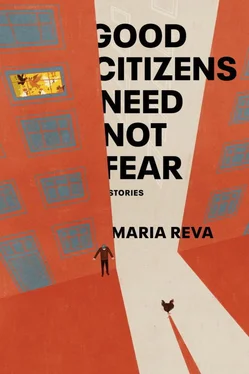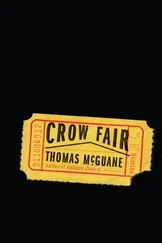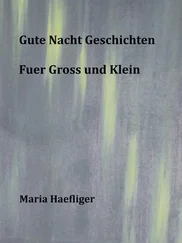Maria Reva - Good Citizens Need Not Fear - Stories
Здесь есть возможность читать онлайн «Maria Reva - Good Citizens Need Not Fear - Stories» весь текст электронной книги совершенно бесплатно (целиком полную версию без сокращений). В некоторых случаях можно слушать аудио, скачать через торрент в формате fb2 и присутствует краткое содержание. Город: New York, Год выпуска: 2020, ISBN: 2020, Издательство: Doubleday, Жанр: Современная проза, humor_satire, на английском языке. Описание произведения, (предисловие) а так же отзывы посетителей доступны на портале библиотеки ЛибКат.
- Название:Good Citizens Need Not Fear: Stories
- Автор:
- Издательство:Doubleday
- Жанр:
- Год:2020
- Город:New York
- ISBN:978-0-38554-529-7
- Рейтинг книги:3 / 5. Голосов: 1
-
Избранное:Добавить в избранное
- Отзывы:
-
Ваша оценка:
- 60
- 1
- 2
- 3
- 4
- 5
Good Citizens Need Not Fear: Stories: краткое содержание, описание и аннотация
Предлагаем к чтению аннотацию, описание, краткое содержание или предисловие (зависит от того, что написал сам автор книги «Good Citizens Need Not Fear: Stories»). Если вы не нашли необходимую информацию о книге — напишите в комментариях, мы постараемся отыскать её.
Good Citizens Need Not Fear: Stories — читать онлайн бесплатно полную книгу (весь текст) целиком
Ниже представлен текст книги, разбитый по страницам. Система сохранения места последней прочитанной страницы, позволяет с удобством читать онлайн бесплатно книгу «Good Citizens Need Not Fear: Stories», без необходимости каждый раз заново искать на чём Вы остановились. Поставьте закладку, и сможете в любой момент перейти на страницу, на которой закончили чтение.
Интервал:
Закладка:
“You should.” Sergei Igorovich kept the receiver pressed to his ear. “Blinov?”
“Yes, Sergei Igorovich.”
“Was it good?”
“The candy? A bit stale.”
Sergei Igorovich let out a brief moan before glancing over at his own superior’s office, to find that he was being observed as well. He hung up.
Daniil placed the wrapper in his drawer, beside the T-square and his drawings of the Cheburashka gang. He turned to the diagram lying on his desk: a tin can containing exactly seventeen black olives. Seventeen was the maximum capacity, provided the olives were a constant size. The ones in the middle compacted into cubes, with barely any space for brine. Good, thought Daniil. No one drinks the brine anyway.
The heater was set to a lavish High. Its amber power light flickered like a campfire. Fourteen figures huddled around the rattling tin box and took turns allowing the warm air to tickle their faces. A few disrobed down to their sweaters. A bottle of samogon appeared from its hiding place, as did a can of sprats. Daniil felt warmth spread to his toes, to his chilliest spots. Aunt Nika took off her hood; her cheeks had gained a lively red. Grandfather Grishko sat on a stool like a king, knees spread, about to bite into a piece of vobla jerky he claimed predated the Great October Revolution.
“Let’s hope the jerky has fared better than Ukraine,” toasted Aunt Nika.
A knock came at the door.
Everyone fell quiet.
Another knock.
Aunt Nika poked Daniil’s arm.
Daniil took another swig of home brew, slid off his chair (which Uncle Timko immediately occupied), and opened the door.
Two tall men in black beanies stood in the narrow hallway, holding a coffin.
Daniil felt himself teeter as his relatives crowded behind him. “If you’re here to collect me, I’m not ready yet.”
“We need access to your apartment, Citizen,” the square-jawed man on the right said.
“Why?” Daniil asked.
The man on the left, endowed with wet meaty lips, rolled his eyes at his colleague. “God dammit, Petya, do we have to give an explanation at every landing?”
“An explanation would be nice,” Daniil insisted.
“The guy on ninth croaked, and the stair landings aren’t wide enough to pivot the coffin,” Petya said. “So we need to do it inside the apartments.”
“Yet somehow you got it all the way up to ninth.” Daniil knew the cabinet-size elevator wouldn’t have been an option.
“When the coffin was empty, we could turn it upright.”
“And now you can’t.”
Petya narrowed his eyes at Daniil. “Some might find that disrespectful, Citizen.” In agreement, Baba Ola flicked the back of Daniil’s neck with her stone-hard fingers. Petya said, “Look, this thing isn’t getting any lighter.”
“You sure you aren’t here to collect anyone?” Daniil asked.
“As you can see, we’ve already collected. Now let us in.”
Daniil stood aside and the men lumbered in with the coffin, trampling on shoes without taking off their own, scratching the wallpaper.
“Yasha, we’ll have to move the cot to make room,” Petya said.
“Which one?”
“Pink flower sheets.”
“Keep holding your end while I set mine down,” Yasha instructed. “Toasty in here, eh?”
“Yes, mind the heater by your feet,” Daniil chimed in.
“I’ll have to step out on the balcony while you pivot.”
Baba Ola lunged at the men, yelling something about the balcony, but no one understood exactly what.
A panicked brood of hens stormed the room.
Aunt Nika clutched at her chest. “Sweet Saint Nicholas.”
“We’ll have to report this poultry enterprise, Citizens,” said Petya.
Daniil was about to tell them these strange hens must have hopped over from another balcony when everything went dark.
The heater’s rattle ceased. The hens were stunned silent. Through the window, Daniil could see that the neighboring buildings were blacked out as well.
“Electrical shortages,” Yasha said. “Heard about it on the radio. Said to stay tuned for scheduled blackouts.”
“Setting the coffin down,” Petya said, voice strained. “It’s about to slip out of my hands—”
“Slow, slow—”
A delicate, protracted crunch—the sound of slowly crushed tin—filled seventeen pairs of ears. Daniil had counted: seventeen, if you included the man in the coffin. For a few seconds, no one said a word.
“Well, looks like we’re going to be here awhile.” Yasha sighed and shuffled, and the stale smell of socks wafted through the air. “Wasn’t there some jerky going around?”
Daniil’s head whirled. Seventeen humans in one room, arms and legs and fingers and toes laced together. Plus one bay leaf. The crunch of the space heater replayed in his mind, even as the cold seeped in. A small clawed foot stepped on his. Seventeen olives. Daniil would die just like this, stuffed and brined with the others, their single coffin stuck in someone else’s bedroom. No one drinks the brine anyway. A brush of feathers huddled on his feet, shivering. Daniil took a step forward, and the feathers swished past. In the dark he felt for the coffin, yanked out the crumpled space heater from underneath it. The corner of the coffin slammed against the floor. The children screamed.
Daniil stepped onto the balcony, flung the heater over the ledge. For a second he felt weightless, as if he himself had taken to the air. A hollow crash echoed against the walls of the adjacent buildings.
He stepped back inside and sank down on his bunk. Wood chips scratched between his fingers.
Grandfather Grishko was the first to speak. “Daniil, go down and get it.” The whispered words were slow, grave. “We’ll get it fixed.”
What was his grandfather hoping for? Still, Daniil would do as he was told, if only to get out of the crowded suite. Then he felt the cold steel of his uncle’s mallet and chisel among the wood chips. He grabbed the instruments and descended to the ground floor. A gruff voice offered caramels but Daniil snatched the bencher’s cigarette lighter instead. He lit its flame, illuminating the red stenciled numbers on the front of the building.
And then he knew what he had to do. He had to get heating, because heating meant Number 1933 Ivansk existed. And if the building existed, he and his family had a place, even in the form of a scribble buried deep in a directory. He would show them proof. He would show the ones behind the glass partitions—he would bring the stenciled numbers to them. Daniil positioned the chisel. The first hit formed a long crack in the concrete, but kept the numbers whole.
LITTLE RABBIT
Sometimes they arrive in vans from the maternity ward. Sometimes in strollers, or inside shawls wrapped around waists. Sometimes from the village, sometimes from the town. Few of the babies have names. If they arrive healthy, they were born unwanted; if wanted, then unhealthy.
The baby house sits tucked behind a hill, out of sight of the village and the town.
It’s bad luck to talk about or show pictures of the babies living at the baby house, much like it’s bad luck to talk about or show pictures of a train wreck or a natural disaster.
The main hall of the baby house has bright windows and three rows of beds, and a sanitarka who makes rounds with a milk bottle. She strokes the babies, talks to each in turn.
She says, “My kitten.”
She says, “I wish I could keep you for myself.”
She says, “They told your mother to try again.”
The director of the baby house is young, eager, and progressive. He’s the darling of the Ministry of Health. The beam of light piercing the fog. The broom battling the cobwebs. Within the first year of his tenure, he urged the Ministry to take a holistic approach to the issue of invalid care. Since adult invalids are classified as Group Ones, Twos, and Threes according to labor capacity, the director believes each baby’s group number can be predicted—projected—at birth. That way the Ministry can anticipate the resources necessary for lifelong collective care.
Читать дальшеИнтервал:
Закладка:
Похожие книги на «Good Citizens Need Not Fear: Stories»
Представляем Вашему вниманию похожие книги на «Good Citizens Need Not Fear: Stories» списком для выбора. Мы отобрали схожую по названию и смыслу литературу в надежде предоставить читателям больше вариантов отыскать новые, интересные, ещё непрочитанные произведения.
Обсуждение, отзывы о книге «Good Citizens Need Not Fear: Stories» и просто собственные мнения читателей. Оставьте ваши комментарии, напишите, что Вы думаете о произведении, его смысле или главных героях. Укажите что конкретно понравилось, а что нет, и почему Вы так считаете.












